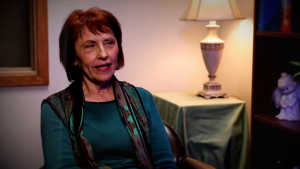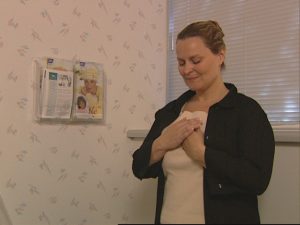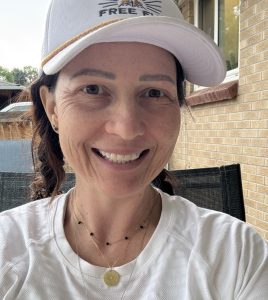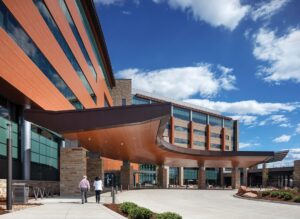By Bob Reynolds
Bobbe Howard is living proof that an affirming attitude makes a difference
Bobbe Howard volunteers for a pet rescue organization, tends her garden in Southwest Denver, and has taken weeks-long motorcycle trips. Judging by the quality of her life today, someone might have trouble imagining that nine years ago she faced bilateral breast cancer, a double mastectomy, and miserable months of chemo and radiation.
Bobbe has survived—and thrived—by seeing her “glass” not as half empty, but as richly full. She doesn’t take her good fortune for granted. She doesn’t sugar-coat her experience; her bout with cancer was no picnic. It all began with a nasty surprise. “I was totally blindsided by my diagnosis,” she recalls. She had done yearly mammograms, and performed self-examinations religiously. For years before her diagnosis the mammograms were often inconclusive, and her doctors would tell her they needed to take more. So Bobbe continued to undergo all kinds of tests. But they always came out negative.
But one day her doctor’s office called her with bad news: She had bilateral breast cancer. The tumors were apparently so advanced, and the situations so urgent, that they didn’t even ask her before scheduling her for surgery, just two weeks later. In light of the ordeal that ensued, Bobbe remarked that “It’s just as well that I didn’t have time to dwell on it.”
“The operation itself was nothing compared to what came next. They told me that I’d lose my hair. Well, that’s fine—I knew what to expect. But the thing is that you lose your hair everywhere: I had no eyebrows, no eyelashes, and no nose hair. That’s when I had my eyebrows tattooed on. I’ve got to have a face! You feel like your body has been taken away from you and everything’s happening to it. … I wanted my doctors to bring back my feeling of self.”
“Chemo just makes you sick in your skin,” Bobbe says. “I’d have done anything to alleviate that. One of the chemo cocktails was so toxic that they came out in these white HAZMAT suits to give it to me—you know, with the face shield and everything. I said, ‘You’re going to put something in my body that you won’t even put on your own skin?’ You lose your sense of smell; you lose your whole sense of being.”
“I think the worst was when I lost my depth perception, and I couldn’t drive. I was living alone and had to depend on people to buy my groceries and take me to the doctor. My fingerprints disappeared. You wonder what’s going to happen next.”
She was working at the time, and had good insurance through her employer. They paid for Bobbe’s weekly Reiki treatments for as long as she was undergoing chemo.
About her Reiki sessions, Bobbe remembers, “You’re willing to try anything when you’re desperate. It’s totally non-invasive, you’re fully clothed, and the practitioner was very nice. It’s a healing experience for an hour. I could go to sleep while I was on the table. It’s amazing—that hour just flew by. The chemical feeling in your body would seem to abate. There were a lot of times during treatment when I would say to myself, ‘I just can’t go any further.’ But after I’d take my session I’d come to realize that ‘Yup, I can do it after all.’”
“I went into Reiki feeling somewhat skeptical, and I was surprised that it worked so well. But the essence [the “ki/chi” energy] is so strong that it makes your body feel so well. I would have gone every day. It’s almost addictive! [Reiki] gives you back your essence, your being. [During Reiki sessions] you felt like you were getting help in a way that nothing else could do.”
The effects of a single Reiki session lasted a day or two for Bobbe. She describes her regimen this way: “You’re taking chemo every three weeks. The first week you take it, you just want to go bury your head. The second week you’re doing better. The third week you’re feeling pretty good, but then you go back in for another treatment. So it’s a cyclical thing.”
When her chemo ended, Bobbe learned about LifeSpark and enrolled, and she received six months of Healing Touch sessions. These sessions were such a godsend for her that she even enrolled in a course at Arapaho Community College, and became certified as a Reiki master herself. Bobbe performs Reiki on herself and her dogs, and used it on her mother when she fell and broke her hip. “There’s a definite change—even in the animals—when you do it on them,” she said. “You feel them relax; they just sink right into it.”
When she went to her first session Reiki was totally unknown to her. She knew no one who had tried it. But since taking classes she’s discovered that it’s becoming widespread, and more accepted in the health care community. Things have come a long way in ten years.”
When asked for her advice to newly diagnosed cancer patients who might be considering Reiki, Bobbe says, “If you have an opportunity, get all the help you can. You’ve got to be willing to put your whole self into the hands of a Reiki practitioner. It’s a mind process that enables you to get through it and survive. Your mind has as much a role in healing as anything a doctor does.” Cancer was never a death sentence to me. I decided early on that I was going to think of having cancer the same way I thought of having the flu.”
She explained that chemo can impair a person’s memory. One of her brothers told her that there were times during her treatment that he didn’t think she even knew he was there. But since then, the two of them have taken epic motorcycle trips together. In the last few years they’ve explored Labrador, Newfound, and Alaska. The Alaska trip was 10,000 miles in three weeks. Since 2007 Bobbe has logged over 50,000 miles on the back of a Gold Wing. When they’ve lost their way on these trips, her brother has jokingly blamed it on his exposure to Agent Orange in Vietnam, and on her “chemo brain.”
Bobbe muses, “Nothing is a guarantee. But that’s life. … One thing I’ve learned is that by going through [something like cancer], you should never postpone till next year something you want to do. There may not be a ‘next year.’ This year my brother Terry and I took a trip to China. Some people might say, ‘I want to do this, but I don’t have the money, so I’ll have to postpone it.’ I say go—just go. And never look back. I certainly have no regrets.”
Bobbe Howard is living proof that a positive outlook, along with some help from complementary therapies, can make all the difference.











